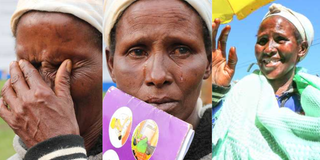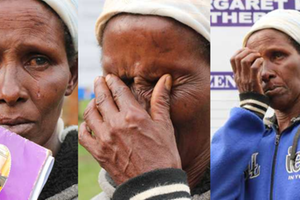
Tears of frustration turned into smiles of joy for Anna Cheptonui, 50, at the Nakuru County Referral and Teaching Hospital on October 2, 2024. Cheptonui, who was initially crying outside the facility, was in distress because her 18-year-old daughter had been detained after giving birth under the Linda Mama programme for an unpaid bill of Sh7,500. The situation took a positive turn when a village elder, moved by her story in the Daily Nation, lent them the required amount and they were discharged on October 3.
Doctors across the country find themselves in a frustrating and painful dilemma as they face growing uncertainty over patient care since they are unable to schedule critical operations or admit patients for necessary treatments.
This delay has left both doctors and patients in a state of limbo, with healthcare professionals growing increasingly concerned about the long-term impact on their patients' health.
The uncertainty is not only creating a backlog of untreated cases but also putting doctors in a precarious ethical position. As healthcare professionals, they swore to provide care and save lives, yet their hands by the hospitals' policies and the restrictions imposed by the SHIF.
On an X space conducted on Wednesday by doctors and lawyers debunking the Social Health Insurance Fund which has left millions of Kenyans in need of health care stranded, the doctors were concerned about the impact of the current situation on patients with chronic illnesses.

KMPDU North Rift branch secretary Dr Jackson Mulei (centre) and other officials address the media in Eldoret on September 27, 2024.
The space dubbed the SHIF con game” conducted for about 2 hours was attended by 4,000 Kenyans demystifying why the system will not work for Kenyans and why they think it was hurriedly done, the challenges with the system.
Dr Bosibori Ondari, radiation oncology expressed fears about what will happen to her patients at the end of the transition.
“Please pray for my cancer patients needing brachytherapy treatment. The National Health Insurance Fund has been paying for two sessions and most of my patients use their spouse’s card to pay for the third session. Each session is Sh40, 000, no patient is going to afford this,” she says.
She adds: “We are going to lose most of these patients from care. It is sad. I am in my car contemplating how to end this mess. Of the five booked patients only one has come. She still doesn’t have the SHA invoice,” she says.
She says, the hospital policy, however, does not allow her to treat without proof of payment.
We are at a standstill,” says a surgeon at a leading private hospital who identifies himself as Kamau, “Without the SHIF, we can’t book surgeries or even admit patients for urgent procedures. It’s heartbreaking to see people in need, knowing there’s little we can do.”
Hospitals, which rely heavily on the insurance fund to cover treatment costs, have had to delay or cancel procedures for patients who can’t afford to pay out-of-pocket. This has resulted in growing queues of patients waiting for surgeries, some in life-threatening conditions.
“These four days have not been easy on us, I have a close relationship with my patients and I feel so bad when they are not getting services that I can easily give but because I am also guided by the hospital policy, I am forced to sit and watch. It is painful,” he says.
He continues: “It is worrying for those with scheduled surgeries. Their conditions are worsening, and we are powerless to help.”
The absence of SHIF has affected not just surgeries but also routine admissions. Many patients who would normally be hospitalized for treatment are being sent home with limited options, causing delays in care that could have severe consequences.
“The longer this situation drags on, the more lives will be affected,” he says. “If the SHIF isn’t reinstated soon, we fear a healthcare crisis of unimaginable proportions.”
Dr Vitalis Ogolla, dentist and a service provider under the former National Health Insurance Fund (NHIF) questioned what the government wanted to achieve with the change of the insurance systems.
“With the increase in SHA deductions, we are creating more money for people who want to loot. Is this a struggle to kill enterprises in this country? Employers are going to struggle to remit these monies,” Dr Ogolla said.
“What is the role of government in giving health services to Kenyans? “I am sure the majority of you in this space, know someone who has been diagnosed with cancer, I don’t see the health officials talking of coordinated healthcare. This is about the money and not the service,” he said.
He says that the new system is going to kill access to health care with many left to die.
“For the dental, I can bet that with the Sh650 that they have put for extraction, no facility can operate with such an amount. This is even below the input cost. Does it mean that the government wants to enslave us in terms of payment? No facility will accept this, and facilities will be forced to operate without a cover,” he says.
Missing a session of either radiotherapy, chemotherapy or brachytherapy increases the risk of cancer recurrence.
Patients who miss sessions during cancer treatment have an increased risk of their disease returning, even if they eventually complete their course of radiation treatment, according to a new study.
“Skipping or delaying the chemotherapy cycles may offset the results obtained with the prior chemotherapy cycles. Some cells are in the resting stage and may divide after completing the previous cycle.
Therefore, the disease may reach the pre-treatment stage if these cells are not killed through the next treatment cycle,” says a study published by the Journal of Clinical Oncology.
It continues: “When a patient skips the chemotherapy cycle, the disease may progress to the next stage, and the oncologists may have to change the complete course of treatment. Eventually, the patient may have to take medicine from the beginning. The patient may also require adjuvant therapy.”
In fast-growing cancers, such as inflammatory breast cancer, skipping chemotherapy may cause the disease to quickly progress to an advanced stage. The oncologists may prescribe intensive chemotherapy treatment along with surgery or radiation therapy.
Cancer remains a significant public health concern, ranking as the third leading cause of death in Kenya after infectious and cardiovascular diseases.
According to Globocan 2022, an estimated 44,700 new cancer cases are diagnosed annually, and 29,300 individuals succumb to the disease.
The most prevalent cancer types include breast, cervical, prostate, oesophagal, and colorectal cancers, affecting both men and women across all ages.
Unfortunately, in Kenya, 70-80 per cent of cancer cases are diagnosed at advanced stages, reducing the chances for curative treatment. Delays in accessing care significantly impact patient outcomes, making timely and affordable cancer services critical.
At Kenyatta National Hospital, a spot checked by the Nation.Africa team at the cancer clinic, patients are grappling with disrupted treatment and uncertainty about their future healthcare leaving them vulnerable and facing mounting bills and life-threatening delays.
Ms Lucy Mwangi*, a breast cancer patient who has been receiving treatment since 2022 is one of the affected patients. Her journey began with a positive diagnosis of grade two, stage three breast cancer in September 2022.
Since then, she has undergone eight chemotherapy sessions, she has gone through surgery, 25 radiotherapy sessions, and targeted therapy all with the support of NHIF.
“NHIF was a lifeline for me,” Lucy says.
“When I arrived today, I was informed that the system was down and that approvals for treatment weren’t being processed as smoothly as before. They asked me to pay cash upfront to receive care,” Lucy says, her voice heavy with frustration.
Each targeted therapy session costs Sh260,000. Under NHIF, she explains, Sh100,000 is covered, leaving her to pay the remaining Sh160,000.
However, this time, her financial situation is reversed.
"I only have the Sh160,000, and I have no idea where I’ll get the additional Sh100,000."
"I have called people I know, but I’m still stranded. I even asked the doctor to go ahead with the treatment, hoping that I could somehow come up with the Sh100,000 afterwards. I know what missing a cancer treatment session could mean for my health."
Her circumstances are made even more difficult by the distance she’s travelled.
“I came from Mombasa to Nairobi for this session. I can’t just leave without getting the treatment,” she adds.
With her next session scheduled for October 25, Lucy’s anxiety is growing.
“I don’t know how I’m going to raise the rest of the money in time. The medication I need isn’t available locally; it has to be imported. Without it, my treatment will come to a halt,” she says, her worry unmistakable.
Lucy’s experience is echoed by many other cancer patients who now face a bureaucratic nightmare as they try to access treatment under the new system. The transition has been anything but smooth.
Read: The problem with SHIF
Long delays in the approval process, confusion over coverage, and a lack of clarity from hospital staff have left patients like Lucy wondering how long they can hold out.
*Mary Atieno, whose relative is undergoing radiotherapy at KNH, describes the frustration of moving from one block to another in search of help.
“We arrived at 8 am, and by noon, we were still not attended to,” says Mary. “Since Tuesday, it’s been the same story — just moving from one queue to another, with no clear answers from the staff.”
“We have been told we will have to fill in forms every time we come for treatment and pay cash if the system doesn’t approve the coverage in time,” she adds.
Even as patients suffer, Dr Eavnson Kamuri, Kenyatta National Hospital chief executive maintains that all patients have been receiving health care with seamless admission to inpatients and onboarding new patients for outpatient services.
Dr Kamuri expressed confidence in the program stating that the hospital has continued to provide uninterrupted care to all patients regardless of their registration status.
“Since the launch of the SHA program, the hospital has successfully provided a wide range of essential medical services including renal dialysis 34, inpatient admission 138, and chemotherapy 91 with 62 patients getting their radiotherapy,” says Dr Kamuri in a statement.
The Kenyan Network of Cancer Organizations (KENCO) has warned that despite assurances that the process would be seamless—particularly for vital services such as dialysis and cancer care, patients are being denied services or asked to pay out-of-pocket for their cancer treatment with many patients leaving without receiving care.
“This disruption leaves cancer patients, many of whom rely on insurance for their treatment exposed to disease progression, which can have severe consequences. This is unacceptable. We call on the government to urgently implement measures to ensure that patients can continue accessing services at their preferred facilities without interruption,” says a statement.












